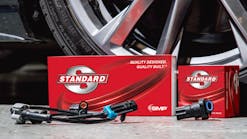Robots, service channels help Denso cover bases
Denso is classified by many as an auto parts manufacturer, but the company also boasts a worldwide service network, unique manufacturing processes and service centers that act as distributors. In the United States, the company's service side is focused on the heavy-duty industry, with more than 800 heavy-duty electrical service centers and just less than 400 heavy-duty diesel service centers, according to Gene Gollub, supervisor for Denso's Heavy Duty Aftermarket Field Technical Service. When light-duty diesel vehicles become more prominent with U.S. drivers, Denso plans to cover the service end for these vehicles as well, much like the company does in Europe and a host of other countries. One of the many advantages to having both manufacturing and repair in same company is the creation of valuable feedback from the technician back to the factory, says Fran Labun, vice president of the Sales Group for Denso Sales California. "You have that good information flow when you do that repair," he says. "We try to close that circle on quality from the initial delivery product all the way through." Another advantage is the premium quality of the company’s aftermarket training. Denso does not, however, distribute its products to its service centers. In many instances, the company will sell to a WD, which then sells the products back to a Denso service center, adds Labun. "We don't sell direct to installers or service stations." The most unique repair system is perhaps found in Japan, the country of Denso's headquarters, where the company's repair shops work on most vehicle systems, and even perform non-vehicle work like household appliance repair. Also in Japan, some repair shops that are specialists in certain product categories act as distributors to other service centers. A globalized approach to manufacturing Aftermarket Business recently toured the company's Tennessee facilities, including Denso Manufacturing Tennessee's (DMTN) starter and alternator operations, and the company's Athens campus (DMAT), where such items as fuel injectors, oxygen sensors and spark plugs are made. Charts measuring productivity adorn the walls, and employee innovation is rewarded, as any level of worker is encouraged to pass along ideas to help make the teams more productive. The Athens factory even has a health care facility in-house, where workers are not required to submit a copay, another cost- and time-saving measure. Workers from the United States and Japan are also selected for exchange programs, where they can be embedded in the corporate culture of the respective host country. Yet another interesting aspect of Denso's factories is the robotic arms that work alongside employees. In fact, Denso is also a manufacturer of robots, and the company provides these robots to other industries, like medical, pharmaceutical, packaging, labs and universities, adds Labun. "We're known as an automotive firm, but the use of robotics is expanding tremendously in other industries." A Denso rep says that the evolution of its robotics does not threaten its flesh-and-blood workforce: the employee base is already lean enough to fortify itself against any recessions the local economy may experience or any evolutions that may occur with workplace automation. |

